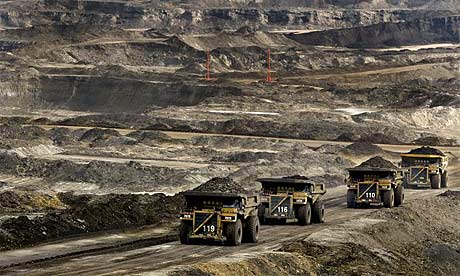Johannah Bernstein post: "eternally proud of my father’s extraordinary aeronautical engineering. legacy. here is a photo of the Canadair Water…
Wednesday Night #1336 Update – More on Tar Sands
Written by Diana Thebaud Nicholson // December 10, 2007 // Wednesday Nights // Comments Off on Wednesday Night #1336 Update – More on Tar Sands

Trucks on the tar sands of Alberta. Photograph: Jeff McIntosh/AP
This Canadian wilderness is set to be invaded by BP in an oil exploration project dubbed … ‘The biggest environmental crime in history’
10 December 2007
BP, the British oil giant that pledged to move “Beyond Petroleum” by finding cleaner ways to produce fossil fuels, is being accused of abandoning its “green sheen” by investing nearly £1.5bn to extract oil from the Canadian wilderness using methods which environmentalists say are part of the “biggest global warming crime” in history.
The multinational oil and gas producer, which last year made a profit of £11bn, is facing a head-on confrontation with the green lobby in the pristine forests of North America after Greenpeace pledged a direct action campaign against BP following its decision to reverse a long-standing policy and invest heavily in extracting so-called “oil sands” that lie beneath the Canadian province of Alberta and form the world’s second-largest proven oil reserves after Saudi Arabia.
Producing crude oil from the tar sands – a heavy mixture of bitumen, water, sand and clay – found beneath more than 54,000 square miles of prime forest in northern Alberta – an area the size of England and Wales combined – generates up to four times more carbon dioxide, the principal global warming gas, than conventional drilling. The booming oil sands industry will produce 100 million tonnes of CO2 (equivalent to a fifth of the UK’s entire annual emissions) a year by 2012, ensuring that Canada will miss its emission targets under the Kyoto treaty, according to environmentalist activists.
The oil rush is also scarring a wilderness landscape: millions of tonnes of plant life and top soil is scooped away in vast open-pit mines and millions of litres of water are diverted from rivers – up to five barrels of water are needed to produce a single barrel of crude and the process requires huge amounts of natural gas.
Mud, sweat and tears
Aida Edemariam, The Guardian
October 30, 2007
The vast tar sands of Alberta in Canada hold oil reserves six times the size of Saudi Arabia’s. But this ‘black gold’ is proving a mixed blessing for the frontier town of Fort McMurray, fuelling both prosperity and misery. As the social and environmental toll mounts, Aida Edemariam reports on the dark side of a boom town
… As the Middle East has become more unstable, as Iraq has boiled into chaos, other, more unexpected places have flourished, and none more so than Fort McMurray. Five hours’ drive north of Edmonton, in Alberta, it has always been a frontier town, and even before the first white explorers came fur-trapping, the Indians knew that this place sat on oil – they used it to waterproof their canoes. The trouble has always been that it’s not conventional crude, easily liberated from the earth, but tar sands (also known as oil sands) – a mixture of sand, water and heavy crude which is much more difficult and expensive to extract. It can cost about Can$26 ($US27; £13) a barrel to do so – so when that was comparable to the price of oil, there was no point in trying; now that oil is close to breaking the $100-a-barrel barrier, there definitely is.
For years there were only two outfits mining the Athabasca oil sands, which occupies 141,000 square kilometres; now there are seven, including Shell, whose first plant became operational in 2003, the year the Iraq war started (the remaining four have not yet started production). Eventually, Shell alone intends to extract 500,000 barrels a day, and to do so for 50 years; in total 1.2 m barrels are extracted each day, a number projected to rise, when all the plants are operational, to 3.5m. The companies intend to invest $100bn in the area in the next 15 years; if oil prices stay as they are, or rise, and once the capital costs are paid off, they’re playing for possible profits of tens of billions a year – much of which will come from America, gleeful at this sudden access to so much “safe” oil right next door.
Current technology means companies can reach only about 10% of deposits, but even that makes the Athabasca oil sands the second largest proven oil reserve in the world. Add in the so far unreachable 90%, and Alberta’s oil reserves would be at least six times the size of Saudi Arabia’s. Already Canada produces as much oil as Kuwait. Soon it’ll be two Kuwaits. Canada is the biggest single supplier of crude oil to the US. Small wonder Canada is increasingly described as the world’s next great energy superpower. Complete article


